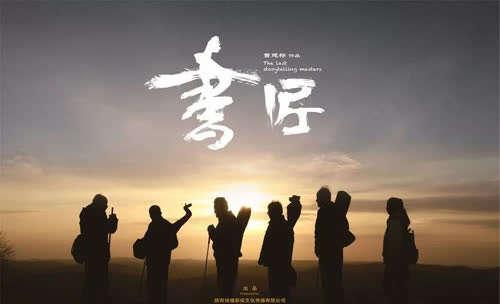In northern Shaanxi, storytelling was once an important form of music art. However, with the change of the times, not only the ancient art forms have been seriously affected, but the living conditions of folk artists are also particularly worrying. Cao Jianbiao's documentary "Bookmaker" focuses on the blind storyteller who was once active between the ravines and is now being forgotten.

In Storytellers, Benjamin argues that traditionally stories come from two groups: sailors on merchant ships who bring tales from afar, and local farmers who bring legends from generation to generation. Blind storytellers in northern Shaanxi may be called the third type of storyteller. Illiterate storytellers are revered as "bookmakers". They are considered "gifted theocracy" and cannot be offended or discriminated against, which is both a conventional endowment and a helpless act to make a living. At the source of the Western narrative tradition, Homer the Blind laid the foundation for epics; on China's Loess Plateau, blind calligraphers flowed with the inheritance of the "Three Emperors". Like the light in the dark vision of the bookmakers, the sanshin opens up a unique audiovisual synaesthesia space: it is attached to the land, but it soars beyond the land and soars over the god realm.
Although it is an ancient skill, the reality of the bookmaker is extremely difficult. There are two unforgettable details in the film: one is that Cao Bozhi, a storyteller in Yan'an, invites the bookmaker Zhang Chengxiang to eat at a fast food restaurant, in the process, Cao Bozhi reminds Zhang Chengxiang: "Your spoon is not scooped up"; the other is that the bookmaker Zhang Bin is going out, and his wife reminds him plainly and concernedly: "You slow down." Eating and walking, these are the simplest and most ordinary pieces of life, but for blind people, they are practiced and overcome over and over again. However, countless times of practice and exploration, it is still impossible to avoid mistakes. Blind bookmakers can only rely on memory and mouth to store and export the stories in their heads, which they call "selling mouths." This skill of using sound is now gradually falling into "silence" and "silence" because of a long time of non-livelihood, and Zhang Chengxiang's forgotten words and Caton during his performance show the helplessness and helplessness behind this mistake due to strangeness.
At the temple fair, Zhang Chengxiang competed on the same stage with the new "bookmaker". These new "bookmakers," in groups of three or five, with professional costumes and bands, called themselves "companies." The point is, they are all normal people, known as "long-eyed bookmakers". They put up an advertisement in the performance venue: "Pushing out the old, a hundred flowers blooming.". The competition ended with Zhang Chengxiang's defeat, and the audience was gradually attracted to the "long-eyed bookmaker". Sadly, because he could not see, Zhang Chengxiang could not judge the number of spectators, and could only play the piano and roar with all his might, performing for the imaginary audience, even if there was no one in front of him. In fact, this does not mean that the art of storytelling has lost its market in northern Shaanxi, compared with the "bookmaker" who is at a loss under the impact of the times, the "long-eyed bookmaker" has seized the market with the help of emerging media and new skills.
In fact, the Bookmaker explores the possibility of inheritance from the very beginning. In the film, Liu Yan, a young female singer from northern Shaanxi, participates in a television competition and specifically visits Cao Bozhi, a storyteller in her 70s. Following in the footsteps of Liu Yan's search for old artists, the film also reveals the current situation of blind bookmakers. This is the first clue in the film, but this clue is interrupted when Liu Yan decides to switch to the "long-eyed calligrapher" He Si to learn the three-stringed piano. Unlike blind bookmakers who learn to play the piano in order to survive, Liu Yan is only to complete the performance task, and in this regard, it is obviously more convenient and efficient to learn from He Si. A few months later, Liu Yan won the weekly championship of the "Walk of Fame" as she wished.
Another clue in the documentary is that Cao Bozhi wants to set up a blind storytelling propaganda team. Originally, Zhang Chengxiang did not want to join, but the failure to compete with He Si on the same stage completely buried his last pride and fantasy, and he had to put down his stubbornness and join the propaganda team. The propaganda team finally took shape in a stumbling process, but with it came internal debates and frictions—both the difference between the trio and the lute, and the difference in the content of the inheritance. This group of singers who chanted to the sky never lowered their heads high— that is, they had maintained a rap posture for decades. They love and hold fast to this sacred and timeless cause, integrating it with their lives.
Zhang Chengxiang died of carbon monoxide poisoning while roasting wood with charcoal fire. At the last moment of his life, he was unable to speak, which for the storyteller may mean that death has come early. In the unceasing, ups and downs of the torrent of the times, through the broken and abstract symbols of the documentary, we see the living individuals of life and the old and new people in the ups and downs. Through the profound eyes of the bookmakers, we can look at the traditional folk arts that are passing away and transforming, and in the high voice of the bookmakers, we also hear the elegy echoing in the yellow land.
(The author is a teacher at the College of Liberal Arts, Henan University)
Source: Guangming Network